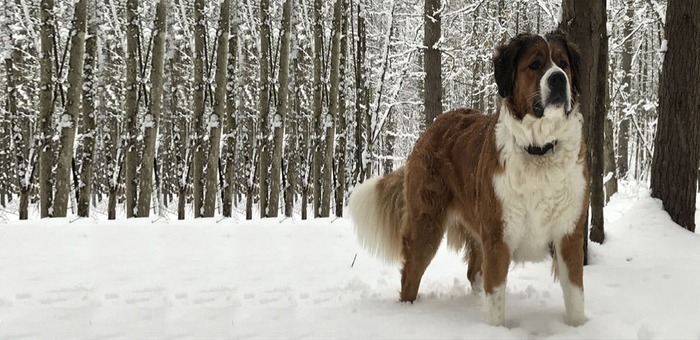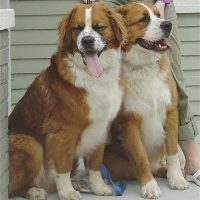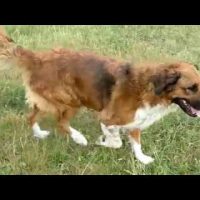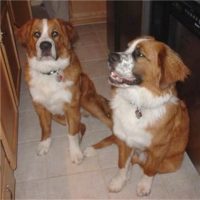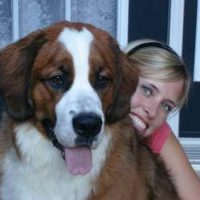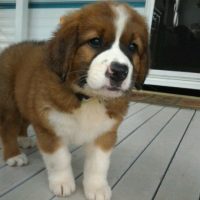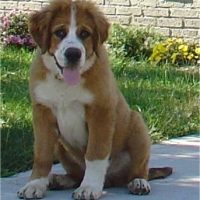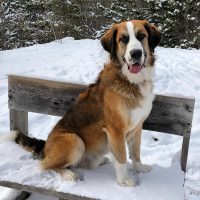The Saint Bernese is a big sized, designer dog breed which is a cross between the Saint Bernard and the Bernese Mountain Dog.
Saint Bernard X Bernese Mountain Dog = Saint Bernese
Contrary to their size, these massive dogs are mild-natured and are great companion dogs.
You May Also Like: “Bernese Mountain Dog“
The Appearance
The Saint Bernese is a rare breed, a mix between a Bernese Mountain Dog and a Saint Bernard dog – both large dogs. The resultant offspring is a large dog that can grow up to 32-35 inches in height and weigh up to 120 pounds.
The canines have a well-proportioned muscular body and a broad chest. They have a taller stature, where the body is taller than its tail.
They have thick and dense coat, which is medium sized and usually straight. The coat color may vary from white, black, brown, cream or a combination of any of the two.
They have brown round eyes which are very expressive, and floppy ears, a pointed muzzle and are active dogs always ready to play around.
Saint Bernese Pictures
Quick Information/Facts
| Characteristics | Details |
|---|---|
| Name | Saint Bernese |
| Other Names | Saint Berner |
| Color | Medium, Dense, Straight |
| Coat | White, Brown, Black, Fawn, Creme, Pied. |
| Breed Type | Crossbreed |
| Breed Group | Companion Dogs |
| Size | Large |
| Hieght | 26-32 Inches |
| Weight | 110-170 Lbs |
| Life Span/Life Expentancy | 6-10 Years |
| Temperament | Affectionate, Loyal, Mind-Mannered, Lovable, Trustworthy |
| Shedding | High |
| Hypoallergenic | Unknown |
| Barking Level | Moderate |
| Energy Level | Active |
| Good with Children | Yes |
| Good with Other Dogs | Yes |
| Competitive Registration/Qualification Information | ACHC, DRA |
Temperament
These incredibly loyal dogs will take no time to be your favourite. They have a lovable personality and are known for their, mild, calm, trustworthy nature. They are very affectionate to the family members, kids and other pets and thus make ideal family and companion dogs.
The Saint Berner is not an aggressive dog although their massive size may be enough to deter any prowlers. Quiet, thoughtful, yet kind of goofy at times – this gentle dog relishes time with the family and will be a loyal and devoted companion.
However, these dogs may be stubborn at times and have temperamental issues. Try to deal with the stubbornness with patience and positive enforcement techniques. These dogs have a habit of drooling.
The Saint Bernese is not an apt choice for apartment style living owing to their huge size. A house with a backyard will suit their temperament. These dogs are adaptable to most climates except the extreme heat because of their dense double coat.
Care ~ Exercise
The Saint Bernese is a highly active breed which needs at least an hour of physical activity and exercise per day to keep him mentally and physically stimulated.
Daily walks, jogging and running around the park will be great for your pet and will help him socialize with people and other dogs as well. This will keep his energies channelized and help them to be even-tempered and not develop restlessness or temperamental issues.
These dogs are a a perfect choice active families and love to enjoy games and playtime with children although their size can intimidate the little kids unintentionally at times so supervise playtime carefully.
These intelligent dogs is happy to move around and loves to please, so keep them busy, and they will happily snooze at your feet in the evenings.
Grooming and Maintenance
Your pet Saint Bernese will be a medium maintenance dog which will need regular grooming. These dogs are heavy shedders, so regular cleaning of the fur from the floor can be a routine job. A Saint Bernese is not a hypoallergenic dog breed.
They have thick and dense coat which requires a good strong bristle brushing daily will remove most stray hairs and prevent your dogs hair from matting.
They may be prone to eyes and ears allergies, so clean them regularly and visit the veterinarian once a while for check-ups. Your dog will not much of bathing. Bathe them when they are dirty with a mild dog shampoo which is gentle on their skin.
Apart from this regular grooming, like trimming their nails, brushing their teeth is advised to keep your dog clean, tidy and healthy.
Health Problems
Crossbreeds are usually more healthy than their parent breeds and have less health issues. But the St. Bernese tends to inherit many of its parent breeds’ health problems as well as may develop the typical problems that all giant dogs deal with.
The average life expectancy of the St. Berner is approximately 7-10 years, which is quite shorter than other giant breeds.
When adopting one of these dogs, try to get all the vet papers and health certifications from its breeder. You should also get the dog tested when they come of age for other tests. (Some health tests require the dog to be at least two years old.)
Some major health concerns may be:
- Bloat
- Cancer
- Obesity
- Allergies
- Eye problems
- Hip dysplasia
- Thyroid issues
- Joint complications
- Von Willebrand’s Disease
To keep your dog healthy and up to date on its shots, an annual visit to the vet is required.
Training
The St. Bernese is an intelligent dog breed and are not difficult to train. They love to please their families and will respond well to training if you are patient and encouraging with them.
These gentle dogs are smart but can be a little stubborn at times. Keep the training sessions fun and short, so your dog doesn’t lose their focus and become bored.
Positive Reinforcement: Like all other dogs these pooches respond well to praise, encouragement and treat session.
Obedience Training: Try to teach them to obey commands from their young puppy days. This will help you to raise your dog as a well-rounded one.
Socialization: Early socialization for the puppy is necessary to make them comfortable with strangers, children and other pets.
Diet/Feeding

